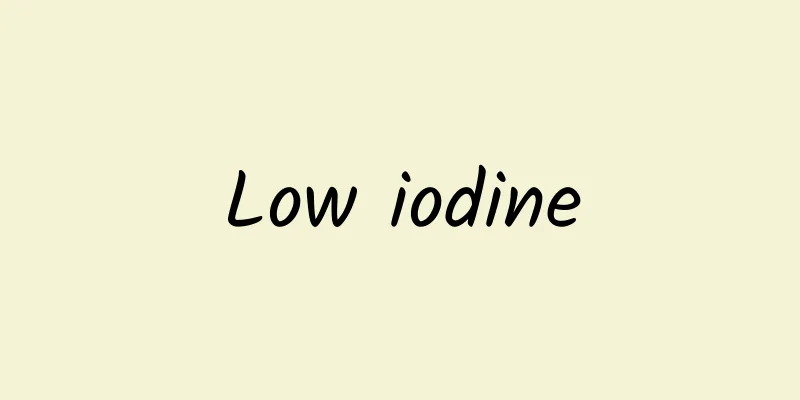Low iodine

|
Thyroid disease is a disease in which the body's metabolism is reduced. When suffering from this disease, the patient will feel obviously pale, which is what we often call bloodless. At the same time, memory loss, slow reaction, dizziness, headache and some cardiovascular problems will also occur. When suffering from hypothyroidism, the patient should go to the hospital for examination and receive effective treatment under the guidance of a doctor. If iodine is low, you need to consider whether there is a problem with hypothyroidism, but you also need to combine the free thyroxine and thyrotropin values to judge this situation. You can send the thyroid function test report for a look. If the free thyroxine is also low and the thyrotropin is elevated, hypothyroidism is considered and supplementary treatment is needed. Symptoms of hypothyroidism : 1. Pale complexion, swollen eyelids and cheeks, indifferent expression, dry, thickened, rough and scaly skin all over the body, non-pitting edema, hair loss, sallow hands and feet, weight gain, and thick and brittle nails in a few patients. 2. Neuropsychiatric system: memory loss, mental retardation, drowsiness, slow reaction, anxiety, dizziness, headache, tinnitus, deafness, nystagmus, ataxia, slow tendon reflexes, prolonged Achilles tendon reflex relaxation period, and in severe cases, dementia, stupor, and even coma may occur. 3. Cardiovascular system: bradycardia, decreased cardiac output, low blood pressure, dull heart sounds, enlarged heart, and coronary heart disease may occur, but angina pectoris and heart failure generally do not occur. Sometimes it may be accompanied by pericardial effusion and pleural effusion. Severe cases may develop myxedema cardiomyopathy. 4. Digestive system: anorexia, abdominal distension, constipation. In severe cases, paralytic ileus may occur. The gallbladder contraction weakens and becomes enlarged, and half of the patients suffer from gastric acid deficiency, leading to pernicious anemia and iron deficiency anemia. 5. Musculoskeletal system: muscle weakness, pain, and stiffness, which may be accompanied by joint diseases such as chronic arthritis. 6. Endocrine system: Excessive menstruation, amenorrhea due to long-term illness, and infertility in women; impotence and decreased libido in men. A small number of patients experience lactation and secondary pituitary enlargement. 7. When the condition is serious, stress such as cold, infection, surgery, anesthesia or improper use of sedatives may induce myxedema coma or "hypothyroidism crisis". Symptoms include hypothermia (T<35℃), slow breathing, bradycardia, decreased blood pressure, relaxation of limb muscles, weakened or disappeared reflexes, and even coma, shock, and heart and kidney failure. 8. Cretinism: dull expression, low and hoarse voice, pale face, periorbital swelling, widened distance between eyes, flat nose, thick lips and drooling, large and protruding tongue, short and thick limbs, and duck gait. |
<<: Can taking Chinese medicine shrink tumors?
Recommend
Why are my fingers numb?
In life, our fingers help us complete most of our...
What are the effects of hawthorn? What are the benefits of eating hawthorn
Hawthorn is a very healthy food with high health ...
How does the philtrum deepen? How to care after philtrum deepening surgery?
Everyone has a philtrum, but the depth of the phi...
How to treat snake spots most effectively
Shingles, also known as herpes zoster, is a highl...
What fruits can't you eat when your period comes?
Menstruation is a special period with many dietar...
What are the symptoms of intestinal damp heat
Intestinal damp-heat is a term in traditional Chi...
What are the effects of Shifu?
Shifu is a relatively common Chinese patent medic...
Can varicose veins heal on their own?
The problem of varicose veins can be serious or m...
Treatment for insomnia in women
Modern people are under great pressure at work, o...
What are the herbs for gallstones?
Gallstones are relatively common in our daily lif...
What to do if your double eyelids are loose
As people age, their upper eyelids will become lo...
Causes of mycoplasma infection in newborns
Mycoplasma infection in newborns is relatively co...
Symptoms of excessive moisture in the body, these cannot be ignored!
Moisture in the body endangers everyone's hea...
Taboos of Poria powder
Poria cocos is a kind of herbal plant that can be...
How to treat impetigo
Impetigo is a contagious disease, which we often ...









